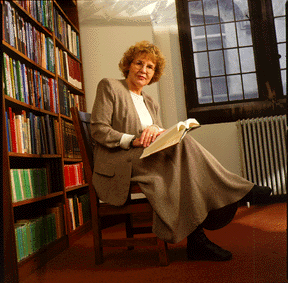
Continued
 The University of Chicago Magazine June 1996
The University of Chicago Magazine June 1996
Continued

these days, extremely busy. While ruefully conceding that "the danger of being an public intellectual is that it becomes more and more public and less intellectual," for now, at least, she seems thoroughly comfortable in the role. "If we're doing our job," she says of herself and others who do their scholarship in the public eye, "I think what we do is to offer the richest, most complex description of a situation that we can and then try to alert people to what political, civic, ethical, and philosophical resources we can draw on to help us see our way through this mess." Reluctantly, she adds, "I think it's a toss-up whether we are going to make it or not."
Her message--that America's in trouble with a capital T--is clearly in demand. "I have a feeling I'm expressing what people feel in their bones," she says, citing polls that show how more Americans than ever before believe that, as a nation, we're on the wrong track. Their response to the question "Do you think most people most of the time can be trusted?" is also at an all-time low.
"Democracy requires laws, constitutions, and authoritative institutions," Elshtain writes in Democracy on Trial, "but it also depends on what might be called democratic dispositions." These dispositions include "a preparedness to work with others different from oneself toward shared ends; a combination of strong convictions with a readiness to compromise in the recognition that one can't always get everything one wants; and a sense of individuality and a commitment to civic goods that are not the possession of one person or of one small group alone.
"But what do we see when we look around?" Elshtain asks her readers. "We find deepening cynicism; the growth of corrosive forms of isolation, boredom, and despair; the weakening, in other words, of that world known as democratic civil society, a world of groups and associations and ties that bind."
Those ties can take the form of PTA or church membership, volunteer work in political campaigns, neighborhood organizations, even bowling leagues. She frequently mentions the wake-up call delivered by Harvard political scientist Robert Putnam. Putnam's essay, "Bowling Alone: America's Declining Social Capital," published in Journal of Democracy, charted a steep decline in bowling-league membership across the country. Many people still bowl, Putnam pointed out--in fact, more bowl than vote--but they're bowling alone, reflecting a growing reluctance of Americans to join groups of any kind.
"We've developed an excess of hypersensitivity," says Elshtain with her characteristically rapid delivery. "We don't engage for fear someone will take offense, so we walk away from opportunities for engagement--yet democracy requires that we make leaps of imagination, requires that we attempt to listen to the other, that we make empathetic understanding of what that experience might be like. That's what the civil-rights movement was all about. Yet while we descend into isolation and refusal to engage, emerging democracies all over the world are looking to the American experience for signs of hope and signs of inspiration."
Elshtain blames two general trends for draining the vitality of American democracy. One is the emergence, or triumph, of a "juridical" model of politics. By this she means the exercise of politics has become more and more like a courtroom in which there are accusers and accused, winners and losers--and the winner takes all. Such a process, she says, "refuses to acknowledge there can be real honor in the process of democratic negotiation or compromise."
"Compromise can be an ideal," she stresses, "rather than a sign of collaboration with the regime. It can be a way in which we make pledges to one another. It is, in fact, a democratic way to do politics." Certain issues--slavery, for example--do "violate so deeply the constituted principles of a democratic order that compromise isn't warranted. But most issues aren't like that."
As damaging as the current lack of compromise, says Elshtain, is the emergence of a therapeutic, or "pop-psych," worldview. This "psychology of 'me'" feeds into a "politics of 'me'"--a process that, she believes, ultimately undermines notions of accountability and responsibility.
"We don't have sin anymore," she quips. "We have syndromes." In essence we are saying, "I'm interested in the world only so long as it is interested in me."
Contrast our present state with the era of the Lincoln-Douglas debates, Elshtain says, when large audiences sat for hours in the hot sun to listen to these two men make their case on matters of premier importance. "My worry is that we wouldn't even know how to listen anymore....I understand the need for concision in political argument," she adds, "but my worry is that's all there is."
Life is never simple for the earnest child-alert to the ebb and flow around
Continue reading "The trials of apublic intellectual."
Go to:
Return to June 1996 Table of Contents